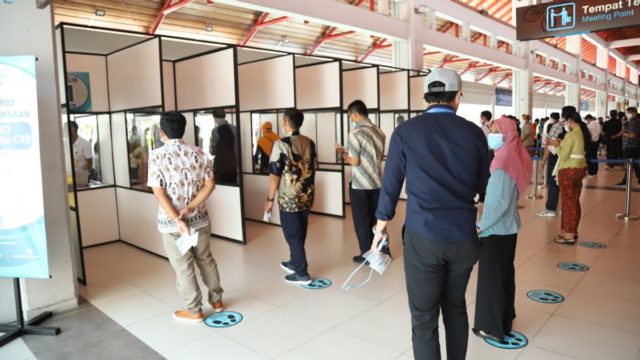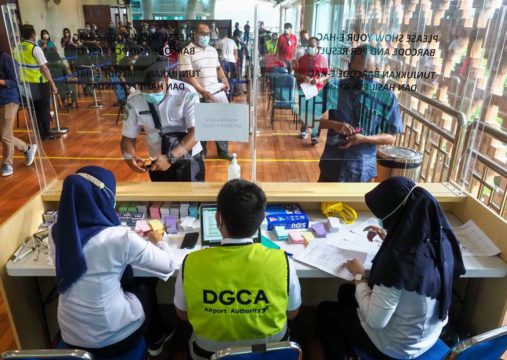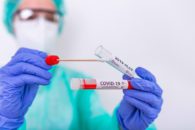Bali’s Governor Wayan Koster has issued Circular Memorandum (No. 08 Tahun 2021) on Monday, 28 June 2021 extending regulations limiting the movement of the local population in Bali in an effort to prevent further increases in the number of COVID-19 cases.

The key provisions of the latest instructions by Bali’s Governor include:
- The establishment of limitations on local movements by the public (PPKM) in all villages and districts, encompassing:
- A requirement that office workplaces in Bali limit attendance to no more than 50% of their workforce with the remaining staff to work from their homes.
- To prioritize a “work from home” regime especially for those staying outside a given regency/municipality in which their office is located.
- Teaching activities being conducted must be done without exception on an online or offline basis. Places of higher education and academies will be allowed to open on a phased basis as set forth in pilot projects outlined in regulations issued by regional leaders and/or follow rules set forth in circular memorandums covering strict application of al health protocols.
- For essential sectors of the economy, such as health, basic food commodities, food, drink, finance, banking – all connected with basic needs of the public, these activites are allowed to operate at 100% capacity but with limitiations on operational hours, capacity, and strict enforcement of health protocols.
- Commercial activities at restaurants, warungs, eating places, and alike – capacity will be limited to 50% of normal capacity with a closing time of 10:00 pm. Take-away and delivery of food can be conducted in keeping with the operational hours of each establishment and by following strict health and safety protocols.
- Shops at shopping centers and malls must close at the latest at 10:00 pm. Strict health protocols must be in effect during the actual opening hours.
- Tradiional markets are allowed to operate but with precautions paid to how shoppers are allowed to circulate, the maintenance of social distancing, and the stricter implementation of all health protocols.
- Construction activities can continue at 100% levels while observing all health and safety protocols.
- Public facilities, including places of worship, art and cultural performances can be held on an abbreviated basis to a maximum capacity of 50% with stricter application of all safety and health protocols. Regional leaders will issue additional refulations as required such as requiring the organizing committee and participants to undergo Rapid Test Antigen screening.
- The public transportation sector will operate with restrictions on capacity, hours of operation, and a stricter application of health and hygiene protcols.
Every individual, business operator, manager, and person responsible for a public place or facility is required to implement all health protocols that include:
- To create a healthy lifestyle free of COVID-19 by 1) requiring the use of face masks, 2) the washing of hands, 3) keeping social distance, 4) limiting local and regional travel, 5) enhancing immunity, and following all regulations.
- Avoiding the congregation of crowds.
- Limiting activities in public places.
- Limiting attendance to 50% of available seating/capacity.
- Limited operational hours in accordance with existing regulations.
Every indivual is expected to limit any activities outside the home and endeavor to postpone or reduce any travel, particularly when such travel passes through “red zones.”
Domestic Travel to and from Bali
Domestic travelers entering the Province of Bali must obey the following regulations:
- Be responsible for the health of each member of their traveling party, following all current rules and regulations.
- Those arriving in Bali by air are required to present a certificate proving a “negative” PCR Swab Test issued within 2 x 24 hours of their departure. Those arriving by land or sea must present a certificate proving a “negative” PCR Swab Test or a “negative” Rapid Antigen Test issued within 2 x 24 hours of their departure.
- When presenting proof of a “negative” PCR Swab Test or a “negative” Rapid Antigen Test must be accompanied by a Barcode/BRCode to prevent falsification.
- Those arriving by air in Bali must also fill a e-HAC card (Indonesian Health Alert Card) to facilitate tracking requirements.
- Children under the age of 5 years are exempted from the requirement to show proof of a PCR Swab or Rapid Antigen Tests.
- Domestic travelers departing by sea, ferry land, private vehicle, and logistic supply vehicles can use a “negative” PCR Swab Test or Rapid Antigen Test that will remain valid for the return journey to Bali.
The managers and operators of airports, seaports, and land transportation tourminal are instructed tighten all rules and regulations connected with the movement of domestic travelers, including the provision of all necessary equipment and manpower. Daily reports and updates must be filed by air, land, and seaport operators with the Task Force for the Mitigation of COVID-19 (Satgas Penanganan COVID-19 Provinsi Bali). Especially as regards the ferry crossing between Ketapang and Gilimanuk closer supervision of swab tests for domestic travelers is ordered via the creation of a joint inspection pos coordinated by the Port Health Office (KKP), facilitated by the State Ferry Company (PT ASDP Indonesia Ferry).
The Province of Bali is instituting a new “3-T” policy to attract visitors emphasizing:
- Testing
- Tracing
- Treatment
The “3-Ts” in combination with a massive inoculation program is expected to be at the forefront of Bali’s plans to welcome international tourists back to the Island.




